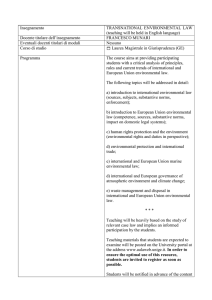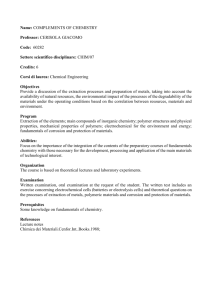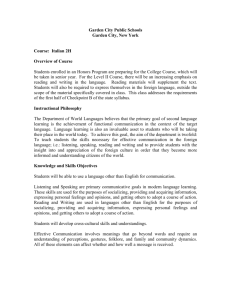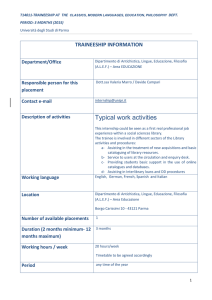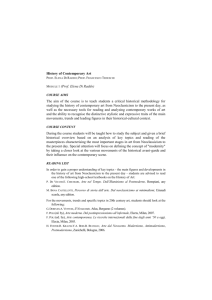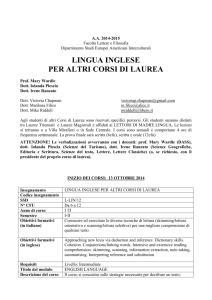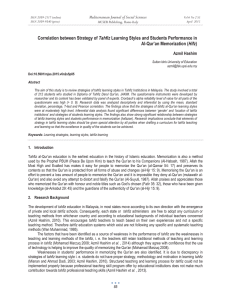Promoting Equity and Access Lynn Boyer West Virginia Department of Education
advertisement
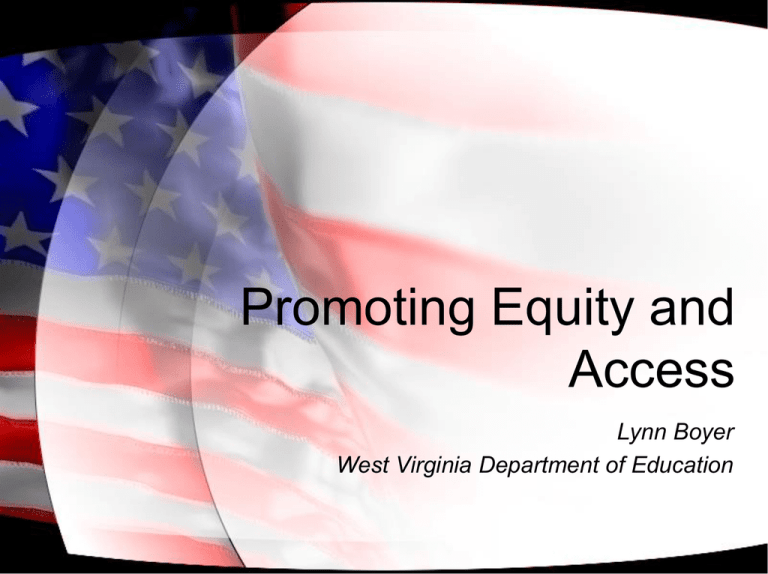
Promoting Equity and Access Lynn Boyer West Virginia Department of Education West Virginia Department of Education NASDSE, 2005 Tiered Instruction Tier 3 Intense Intervention Tier 2 Intervention Tier 1 Core Instruction Universal Screening Research-based Strategies and Materials Tier 1 Core Instruction Differentiation Co-Teaching Levels of Support Tier 1: Benchmark Individual Students Classroom Unit Students generally can meet 75-80% of students are the standards; average making good progress; learner teachers need praise and recognition and may Intervention: Occasional serve as a resource to in-class modifications; others; all teachers SBRR and SBRI in vocabulary and Time: Policy 2510 RLA comprehension strategies requirement Assessment: Assessment every 6-8 weeks Materials: Adopted grade level instructional materials plus reading 25 books per year; SREB recommends 100 pages of technical text to receive credit for one book West Virginia Department of Education Professional Development SBRR and SBRI in pre reading, during reading and post reading strategies and writing strategies Differentiated Instruction training Training on adopted grade level instructional materials Instructional guides and/or standardsbased unit plans Assessments for and of learning Research-based Intervention Small Group Instruction Tier 2 Intervention Scaffolding Progress Monitoring Levels of Support Tier 2: Strategic Individual Students Classroom Unit Students are typically between the 30th-49th percentile on normative measures; 1-2 years behind; gaps in skills and knowledge Intervention: Direct instruction with teacher or one-on-one in the form of reteaching, preteaching, adjustments of pace and complexity; separate reading intervention; possible strategic tutoring program Assessment: Assessment every 3-4 weeks to pinpoint problems and target interventions Materials: Standard reading program with added support class and materials plus reading 25 books per year; SREB recommends 100 pages of technical text to receive credit for one book Classrooms where about onethird of the students are not making benchmarks (25-30%); reading specialists/special education teachers/coaches/content area teachers labeled literacy intensive classes (i.e., social studies class is considered reading intensive) Collaboration and coteaching training Training on adopted grade level instructional materials Time: Policy 2510 requirements for RLA block with defined intervention component Content area teacher training on instructional strategies in reading and writing SBRR and SBRI: building background knowledge; vocabulary; fluency; comprehension strategies West Virginia Department of Education Professional Development Differentiated Instruction training Instructional guides and/or standards-based unit plans Assessments for and of learning Research-based Intervention Smaller Grouping Tier 3 Intensive Intervention Intense, explicit instruction and more time More Frequent Progress Monitoring Levels of Support Tier 3: Intensive Individual Students Students test below the 30th percentile on normative measures; reading skills are limited Intervention: Assessment every 2 weeks to pinpoint problems and target interventions Materials: Intensive intervention to replace traditional ELA class; special supplementary materials and/or specialized program Classroom Unit Classrooms where about half of the students are not meeting benchmark indicators; teachers held accountable to teach the program as designed; reading specialist with assistance from special education/coach Professional Development Program specific training without exception Training on adopted grade level instructional materials DI training SBRR and SBRI: building background knowledge; vocabulary; fluency; comprehension strategies; writing strategies Time: Extended time for literacy; usually are temporary replacement programs for gradeAssessments for and level ELA classes of learning West Virginia Department of Education Levels of Support Advanced Tier Individual Students Classroom Unit Professional Development Students consistently exceed the targets and can handle advance materials; need challenge, extension and enrichment Assessment: Assessment every 6-8 weeks Materials: Standard plus reading 25 books per year; SREB recommends 100 pages of technical text to receive credit for one book Students in the classroom are exceeding the benchmarks as demonstrated through assessment; teachers are models and resources for others; AP and Pre-AP trained teachers Advanced Placement training and material; Pre-AP instructional strategies and materials; Differentiated Instruction training; Training on adopted instructional materials; Instructional guides and/or standards-based unit plans; Assessments for and of learning Time: Policy 2510 RLA requirement West Virginia Department of Education WVBE Goal 1 All students shall master or exceed grade level educational standards that incorporate national and international standards and that reflect 21st century skills and learning. • 2.1 Increase the percentage or number of students enrolled in critical programs and courses, to include the following: • 2.1.a An approved pre-kindergarten program [2020.Obj.9] All eligible students shall be enrolled in a high quality universal pre-k program • 2.1.b A comprehensive PK-12 World Language program • 2.1.c A comprehensive fine & performing arts program • 2.1.d Upper level math and science courses • 2.1.e Honors, Advanced Placement (AP), International Baccalaureate ( IB), Earn a Degree-Graduate Early (EDGE) & dual credit courses • 2.1.f Postsecondary education or training programs for graduates [2020.Ojb.8] Establish a process for maintaining an alignment in public schools, post-secondary and workplace readiness standards, expectations and accountability • 2.1.g Literacy / and or job-specific training programs for adults • 2.1.h Enrolled in 8th grade Algebra and Honors, AP, IB and dual credit courses. WHAT ARE THE FACTORS THAT MUST CONVERGE TO INCREASE EQUITY AND ACCESS FOR ALL STUDENTS TO UPPER LEVEL COURSES?
